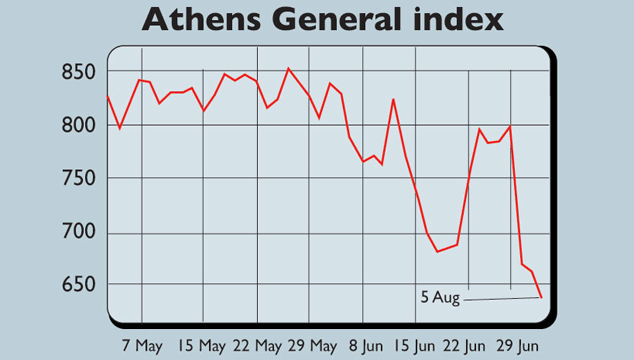Greek stockmarket re-opens – and crashes
The Greek stockmarket, closed this the latest crisis, reopened this week and promptly plunged.

Get the latest financial news, insights and expert analysis from our award-winning MoneyWeek team, to help you understand what really matters when it comes to your finances.
You are now subscribed
Your newsletter sign-up was successful
Want to add more newsletters?

Twice daily
MoneyWeek
Get the latest financial news, insights and expert analysis from our award-winning MoneyWeek team, to help you understand what really matters when it comes to your finances.

Four times a week
Look After My Bills
Sign up to our free money-saving newsletter, filled with the latest news and expert advice to help you find the best tips and deals for managing your bills. Start saving today!

The Greek stockmarket, closed when the latest crisis came to a head in late June, re-opened last Monday and promptly plunged. It closed 16% down, its worst performance since the global crash of 1987. The banks, which had been bleeding capital before they were closed for three weeks, fell by 30%, the daily limit, in a few minutes. The Athens General index slipped a little further the next day.
Grim data covering the past few weeks rattled investors too. An index tracking the manufacturing sector showed that activity plummeted to a record low last month. A federation representing small businesses said their average turnover fell by 48% in July.
What the commentators said
That's "quite an achievement", considering the economy is already 30% smaller than it was in 2008, said Louise Cooper in The Times. And it could complicate further discussions over Greece's third bailout package.
MoneyWeek
Subscribe to MoneyWeek today and get your first six magazine issues absolutely FREE

Sign up to Money Morning
Don't miss the latest investment and personal finances news, market analysis, plus money-saving tips with our free twice-daily newsletter
Don't miss the latest investment and personal finances news, market analysis, plus money-saving tips with our free twice-daily newsletter
The International Monetary Fund (IMF), one of its creditors, is basing its forecast of Greece's debt sustainability, and the bailout cash it needs, on GDP this year being the same as 2014. That now looks "absurdly and laughably optimistic". The bailout sum under discussion has already jumped from around €30bn in early July to the €86bn being negotiated now.
What's more, said Andrew Lilico in The Daily Telegraph, the IMF may be loath to participate in the bailout. It wants Greek debts written down and the government to demonstrate a strong commitment to structural reform. Yet the Greek government is deeply split and Europe won't countenance another write-down, so neither of its wishes will be fulfilled.
If the IMF pulls out, Europe may have to stump up even more, which could be "the last straw for certain members". With the bailout already looking inadequate and the politics getting more and more complicated, don't rule out a Grexit.
Get the latest financial news, insights and expert analysis from our award-winning MoneyWeek team, to help you understand what really matters when it comes to your finances.

-
 Should you buy an active ETF?
Should you buy an active ETF?ETFs are often mischaracterised as passive products, but they can be a convenient way to add active management to your portfolio
-
 Power up your pension before 5 April – easy ways to save before the tax year end
Power up your pension before 5 April – easy ways to save before the tax year endWith the end of the tax year looming, pension savers currently have a window to review and maximise what’s going into their retirement funds – we look at how